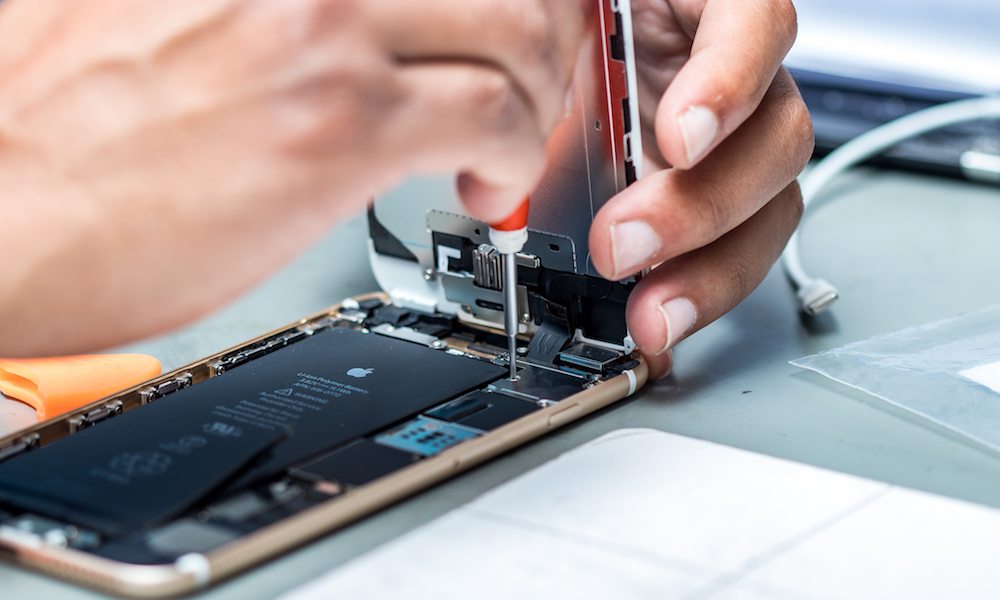Apple’s Fight Against ‘Right to Repair’ Legislation Is About to Go National
 Credit: Apple
Credit: Apple
Toggle Dark Mode
Apple may soon have a much bigger fight on its hands if it wants to continue its opposition to “Right to Repair” laws, as the U.S. Federal Trade Commission (FTC) prepares to draft new legislation at the national level.
- “Right to Repair” legislation is designed to force manufacturers to make first-party replacement parts and technical repair manuals available to independent repair shops and consumers.
- Such legislation would be a death blow to Apple’s tightly controlled Authorized Service Provider Program, which limits the availability of parts and internal specs to partners who have specifically signed agreements with Apple — and undertaken the proper training.
Until now, however, “Right to Repair” laws have been enacted on a state-by-state basis, and only a few states have really made any headway on these initiatives, including New York, Nebraska, Minnesota, Massachusetts, and New York. Nonetheless, Apple has stringently fought against these laws, sending representatives and lobbyists to state legislators to convince them that any such legislation should, in the very least, exclude smartphones.
According to Bloomberg, however, it looks like Apple may have to take its fight to Washington, as U.S. President Joe Biden has just directed the FTC to draft a new set of rules “aimed at stopping manufacturers from limiting consumers’ ability to repair products at independent shops or on their own.”
While the President’s directive leaves a lot of latitude for the FTC to decide on the scope of the rules, sources say that it’s expected to specifically call out mobile phone manufacturers as one area that needs regulatory attention.
Apple and ‘Right to Repair’ Laws
Apple has claimed on several occasions that forcing it to provide proprietary technical schematics and internal repair manuals on demand would compromise the security and privacy of its iPhone platform. In fact, back in 2017 an Apple representative told lawmakers in Nebraska that the state’s Right to Repair bill could turn Nebraska into a “mecca for bad actors,” rolling out the red carpet for hackers and criminals.
Apple has also suggested that Right to Repair legislation could leave users open to risks of harming themselves by conducting repairs on more volatile components like iPhone batteries without taking the necessary safety precautions — something that certainly isn’t outside the realm of possibility.
However, it’s also worth noting that many of the stories we hear of exploding replacement batteries are a result of unauthorized repair shops using third-party batteries, since they don’t have legitimate access to genuine Apple parts.
Although “Right to Repair” legislation would require Apple to sell legitimate iPhone replacement batteries to anyone, it’s unlikely that the FTC would go so far as to force Apple to sell them at a discounted price. This would leave many smaller repair shops still seeking out cheaper and more potentially dangerous third-party batteries to cut costs.
It’s also very unlikely that the new rules would force Apple to make repairs to the iPhone and other products any easier from a purely technical level. While Apple may have to provide the same parts and repair manuals that are available to its Authorized Service Providers and Independent Repair Providers, it wouldn’t be under any obligation to redesign its products.
After all, most of Apple’s products have always received infamously low “repairability scores” from sites like iFixit, as Apple focuses more on durability and design rather than accessibility for repairs.
In fact, Apple’s VP of Environment, Policy and Social Initiatives, Lisa Jackson, said as much back in 2017, when she told the audience at TechCrunch Disrupt that iPhones simply aren’t designed to be repaired by end-users. Jackson noted that Apple prefers to focus on making its products last longer without needing repairs in the first place, as it’s much better for the environment.
Of course, many environmental activists disagree, suggesting that making products more difficult or costly to repair encourages users to throw them out and replace them with new ones, increasing the amount of e-waste.
Broader Reach
In all fairness, Biden’s directive isn’t solely about the iPhone, or even big tech companies in general. Although those are certainly a point of concern, Bloomberg also points to the fact that many farmers face similar challenges when it comes to repair costs from tractor manufacturers, who “use proprietary repair tools, software, and diagnostics to prevent third-parties from working on the equipment.”
In fact, it’s probably telling that the presidential order is also expected to direct the FTC to take other actions related to the agricultural industry. Among other things, this will include new rules that make it easier for cow, pig, and poultry farmers to sue larger companies for unfair contract proceedings, and new “Product of USA” labelling rules.
The executive order is expected to be released in the next few days, and according to White House economic adviser Brian Deese, the ultimate aim is to “drive greater competition in the economy, in service of lower prices for American families and higher wages for American workers.”






